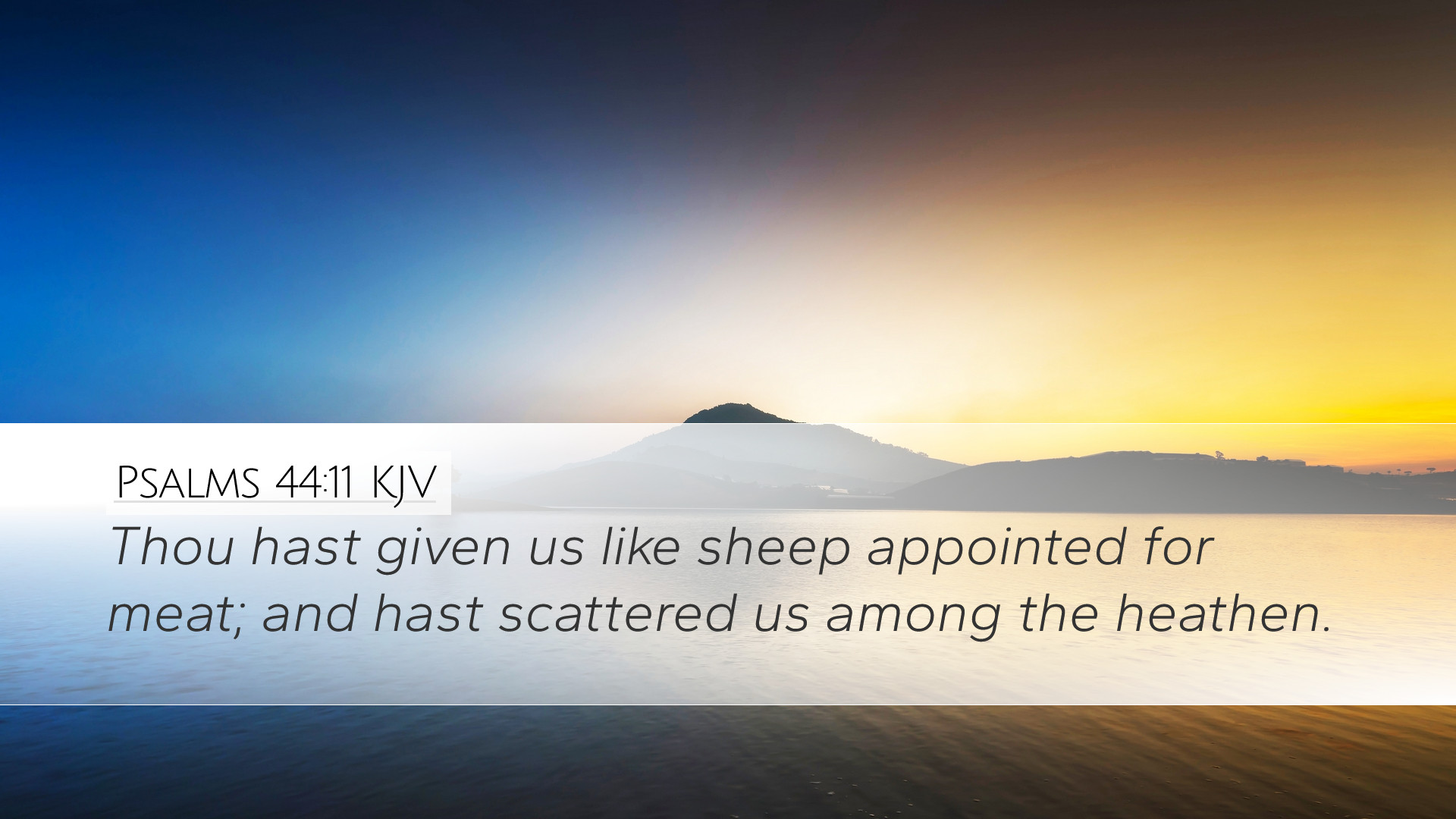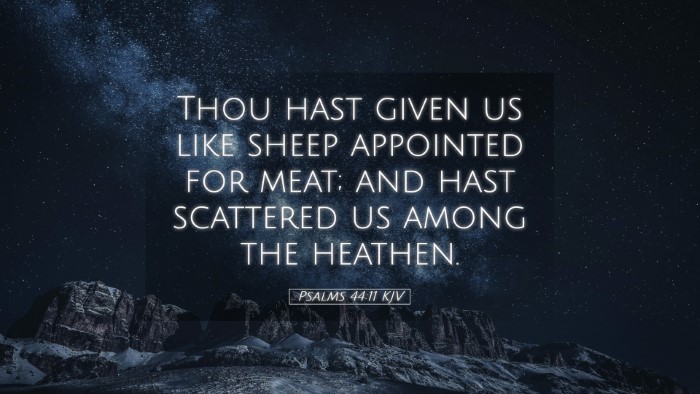Commentary on Psalm 44:11
Verse: "Thou hast given us like sheep appointed for meat; and hast scattered us among the heathen."
Overview and Context
This verse is part of a larger context in Psalm 44, which is attributed to the sons of Korah. It is a communal lament that reflects the suffering and plight of Israel in the face of foreign oppression. The psalmist expresses a profound sense of abandonment by God amidst distress. The imagery of being "like sheep appointed for meat" highlights vulnerability and helplessness, illustrating the dire situation faced by God's people.
Thematic Insights
- The Vulnerability of God’s People: The use of the metaphor of sheep emphasizes the defenselessness of the nation. Sheep are often seen as passive and reliant on their shepherds for protection and guidance. This imagery suggests the profound need for divine intervention.
- Divine Abandonment: The phrase “thou hast scattered us among the heathen” suggests a feeling of being forsaken by God. The psalmist laments that despite past victories and God’s covenant, the current situation feels desolate. This raises questions about divine providence and the reasons for suffering.
- Appeal for Restoration: Implicit in this lament is a yearning for restoration and deliverance. This is not merely a cry of despair but a call for God’s faithfulness to be manifested once again in their lives.
Historical and Cultural Context
Understanding the historical backdrop of this psalm is essential. Many scholars believe this psalm may refer to a time of military or national crisis, possibly during the Maccabean Revolt or other periods when Israel faced hostility from surrounding nations. The scattering among the heathen indicates a loss of national identity and communal integrity, key aspects for the covenant people.
Exegesis
Matthew Henry's Perspective
Matthew Henry remarks upon the deep anguish expressed in this verse, noting that the analogy of sheep signifies a group exposed to violence and slaughter. He emphasizes that God allowed this scattering as a way to discipline His people but notes that it serves as a reminder of their past unity and strength under God's care.
Albert Barnes’ Commentary
Albert Barnes interprets this verse as indicative of the people of Israel’s dire state. He highlights that the phrase “like sheep for meat” underlines their situation of being led to slaughter. Barnes also discusses the significance of scattering, suggesting it reflects a divine disfavor or judgment rather than simply a natural disaster.
Adam Clarke’s Analysis
Adam Clarke expands on the notion of being “scattered among the heathen,” interpreting it as a powerful depiction of loss, both personal and communal. Clarke suggests that the psalmist’s lament is not solely aimed at God’s perceived absence; instead, it calls for a reflective understanding of how Israel has strayed from its covenantal responsibilities and the resultant consequences.
Theological Reflections
- The Problem of Evil: This verse opens up significant theological dialogue regarding the problem of evil and suffering. How does one reconcile the apparent suffering of the faithful with the understanding of a just and loving God? The psalmist's cries resonate with those experiencing suffering, encouraging them to vocalize their pain.
- Hope in Despair: While the psalm expresses deep sorrow, it ultimately calls the faithful to remember God’s past deeds and to maintain hope. This remains vital for classes of faith today facing similar trends of despondency.
- Community Lament: The communal nature of this psalm serves as a guide for believers today. It emphasizes that lament is an acceptable form of prayer, reflecting both deep emotion and a reliance on God’s covenantal nature despite dire circumstances.
Life Application
This verse, while sobering, is a profound reminder for today's believers. Pastors and church leaders can draw on this hermeneutical resource for counseling those in crisis, aiding them in articulating their own laments and struggles. The acknowledgment of vulnerability as a natural part of faith can facilitate deeper connections within congregational settings.
Students and theologians can explore this psalm’s themes as a means of examining contemporary issues of persecution and exile, drawing parallels to global struggles faced by the Church today. The insights from historical commentaries can further guide personal reflections and academic pursuits.
Conclusion
Psalms 44:11 highlights the tension within faith — the juxtaposition of God’s loving care against the backdrop of suffering and perceived abandonment. By integrating the insights of Matthew Henry, Albert Barnes, and Adam Clarke, one finds a multi-faceted understanding of both the despair and hope inherent in this lament. This psalm serves not only as historical reflection but as a contemporary invitation for communal expression of grief, seeking divine restoration amidst life’s trials.


